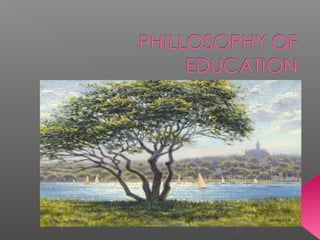
Phillosophy of education
- 2. • Rights in relation to education may be claimed : • on behalf of children • for parents.
- 3. – Claims of parents against the wider community, (represented by the state) – Claims against children themselves (the claims of parents to limit children’s freedom, require certain behaviors of them, and bring them up in certain ways of the parents’ choosing.)
- 4. Religious education Secular education
- 5. parents have a prior right to choose the kind of education that shall be given to their children Education shall be directed to the full development of the human personality and to the strengthening of respect for human rights and fundamental freedoms Education shall promote understanding, tolerance and friendship among all nations, racial or religious groups, and shall further the activities of the United Nations for the maintenance of peace
- 6. The wider adult world may also intervene to protect the child from indoctrination or an education which in other ways falls short of that to which a future citizen is felt to be entitled
- 7. places emphasis on significant differences between the concepts of socialization and education
- 8. Socialization › Belief › Values › Practices of existing society Education › The development of: The critical insight The qualities of self-assurance and self confidence essential › To the development of personal autonomy
- 9. To choose the nature of their children’s education, whether in a particular school or delivered “otherwise (quote the British 1944 Education Act) › private schools › educational selection within the state system
- 10. Parents intentions in the matter of child- rearing in an era of postmodernity: › First, most children are brought into the world voluntarily and intentionally by their parents. › Second, most children are brought up by at least one of their parents and the majority by both.
- 11. expected to indicate a willingness on the part of both parents to enter into a relationship with that child when it arrives
- 12. Deliberation Manifestation the will and intention Planning
- 13. Being prepared to care for the children › Bearing the cost › Looking after them › Living together with them › Sharing a number of material goods › Being there when needed › Being prepared to listen Being considered about the amount of time or resources to be devoted to the children
- 14. a number of different means can often be taken to achieve a particular end there may be a wide divergence of opinion regarding the ends to be achieved in education and child- rearing.
- 15. Not everything can be brought into accord with our “nature”.
- 16. The acceptance of pluralism at the level of society cannot be simply duplicated at the family level. It is possible to accept that different conceptions of the good life exist, this is a merely cognitive acceptance
- 17. To care for one’s children means to care for what they care for.
- 19. Children cannot be taught everything rationally, so that the parents have to prevent them from destroying their lives or their future as long as society places children in their charge › Parents apathy › To remain indifferently to everything children do is to neglect them
- 20. as a relationship that people have sought themselves, in which they are prepared to invest much of their time, resources, and themselves, and that makes them proud of “what they have made” of their children and feel deep sorrow if their children cannot lead satisfactory lives.
- 21. There must be a presumption that many chosen ways of life (secular or religious) are sufficient moral value for it to be permissible for children to be brought up according to their values, customs, and traditions. We enter the world as separate and equal beings and that the right to choose a way of life that is assumed by the parent cannot ultimately be denied the child, either by physical coercion or by indoctrination or the denial of access to education and wider knowledge
- 22. It is important that the believer should not only follow the religious precepts but should choose to do so voluntarily If a way of life is truly good, any additional knowledge, speculation, or enquiry is bound to strengthen rather than undermine it
- 23. It becomes increasingly difficult for parents to envisage a precise for their offspring. Nor is it any longer appropriate to regard their parental role as one in which they are obliged always to be right, as well as possessing absolute power and authority, though they may be as aware as ever that what they do for their children will make a significant difference to their life
